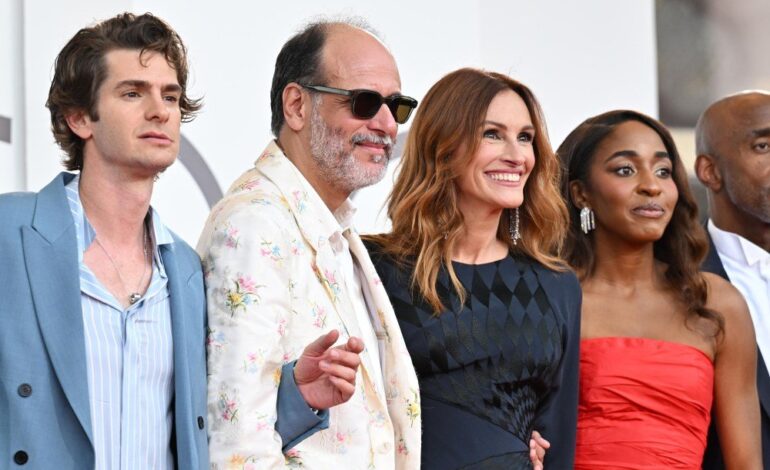Julia Roberts and Ayo Edebiri Steal the Show with Viral Response to Racist Interview Question at Venice Film Festival

I’m Avery Sinclair, a no-nonsense journalist here to give you the lowdown on the latest celebrity drama. As a seasoned observer of all things Hollywood, I’ve seen my fair share of awkward interviews, but the recent Venice Film Festival chat with Julia Roberts, Ayo Edebiri, and Andrew Garfield takes the cake. The real question is, can we expect better from journalists in the future?
During a recent interview at the Venice Film Festival for Luca Guadagnino’s new film, “After the Hunt,” Italian journalist Federica Polidoro for ArtsLife TV asked a question that left many in the audience cringing. Polidoro posed a query about Black Lives Matter and the #MeToo movement, but shockingly, she specifically directed it at Julia Roberts and Andrew Garfield, excluding Ayo Edebiri from the conversation. The question was: “What have we lost in the politically correct era, and what we have to expect in Hollywood after the #MeToo movement and the Black Lives Matter are done?”
Roberts, never one to back down, asked Polidoro to repeat the question, noting “with your sunglasses on, I can’t tell which of us you’re talking to.” Polidoro repeated that her question was for Garfield and Roberts, which only added to the awkwardness. Edebiri, the 29-year-old “Bear” star, interjected, “I know that that’s not for me, and I don’t know if it’s purposeful if it’s not for me… [but] I don’t think it’s done.” She added, “Hashtags might not be used as much but I do think that there’s work being done by activists, by people every day that’s beautiful, important work. That’s not finished, that’s really, really active for a reason because this world’s really charged. And that work isn’t finished at all.”
Garfield chimed in, saying that both “movements are still absolutely alive,” while Roberts spoke up and said that the “work isn’t finished at all.” The viral moment has sparked a heated debate about racism and inclusivity in the media. One fan took to social media to comment, “One thing we’re not talking enough about: how Ayo Edebiri *had* to be gracious in dealing with this appalling behavior and question because she would’ve been criticized for being ‘unprofessional’ or ‘rude’ or every other dogwhistle in the bag.”
Polidoro later took to Instagram to post a statement, claiming she had been subjected to personal insults and attacks because of the question. She wrote, “Following an interview, I have been subjected to personal insults and attacks because of a question that, for some reason, was not well received by some members of the public.” She added, “I find it striking that those who unjustly accuse me of racism and consider themselves custodians of justice find acceptable violent language, personal attacks, and cyberbullying.” However, she failed to explain why she excluded Edebiri from the question.
The internet was quick to respond, with many criticizing Polidoro for her actions. One comment blasted her, writing, “Your lack of accountability is nauseating. You asked a question that expressly concerned people of color, yet you chose not to ask the only woman of color sitting in front of you. Own it, apologize, and do better.” It’s clear that Polidoro’s attempt to deflect criticism only made things worse.
The incident has raised important questions about racism and inclusivity in the media. It’s a stark reminder that even in today’s progressive era, there is still much work to be done. As Edebiri so eloquently put it, “that work isn’t finished at all.” The viral moment has also sparked a conversation about the importance of holding journalists accountable for their actions.
In the end, it’s clear that Ayo Edebiri and Julia Roberts handled the situation with class and poise. As for Polidoro, it’s a lesson learned. The incident serves as a reminder that journalists have a responsibility to be inclusive and respectful in their questioning. Anything less is unacceptable.
And that’s today’s dose of reality. You’re welcome.
Sources: Celebrity Storm and New York Post
Attribution: Creative Commons Licensed
Attribution: Creative Commons Licensed




